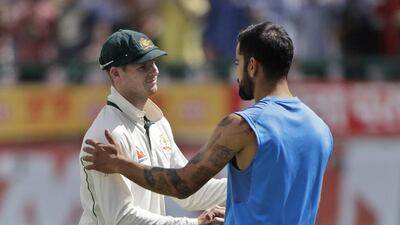Like the series it is most going to be compared with in the years to come, India-Australia 2017 was an unexpected classic.
Back in 2001, Steve Waugh’s Australians were rampant, having arrived in India on the back of a 15-match winning streak. Indian cricket, after a match-fixing scandal, was in disarray.
After Australia made it 16 on the bounce with a three-day romp in Mumbai, most Indian supporters expected the worst. Instead, they got VVS Laxman, Rahul Dravid, Harbhajan Singh and a famous win in Eden Gardens.
If that was not enough, the decider in Chennai – India sneaked home by two wickets – was every bit as compelling.
This time, it was India who were red-hot favourites, having not lost a home Test since December 2012.
Australian cricket had plumbed the depths just months earlier, with an innings defeat to South Africa in Hobart.
But the kangaroo and the emu on the baggy green cap seldom take a backward step, and Steve Smith and his side threw themselves into the Indian adventure with an intensity that shocked the hosts.
First, they batted with rare discipline on a square turner in Pune, before Steve O’Keefe upstaged India’s spin duo with match figures of 12 for 70.
When India were then bowled out for 189 on the opening day in Bangalore, with Nathan Lyon taking eight for 50, it seemed that the Border-Gavaskar Trophy would stay in Australia’s possession.
But while he may have had his worst series with the bat – 46 runs in five innings before hurting his shoulder in Ranchi – Virat Kohli would not allow his team to countenance defeat.
__________________________________
Also from Dileep Premachandran
■ Five of the best – Who ended thrilling series as the toppers?
■ Kuldeep Yadav – 'Dream come true' meeting with Shane Warne
■ Cheteshwar Pujara – One-format batsman proving his worth
__________________________________
On the second day in Bangalore, India conceded just 197 runs while taking six wickets. More importantly, there was snarl and chatter, led by the captain.
It may have been unpleasant to watch at times, but it roused a team that had appeared listless in Pune after a marathon stretch of matches dating back to the Caribbean in July.
Kohli’s bat was muted, and Ravichandran Ashwin, struggling with a sports hernia, was nowhere near as effective as he had been earlier in the season.
Despite that, India kept finding new heroes. In Bangalore, it was Cheteshwar Pujara and Ajinkya Rahane adding 118 on a pitch with variable bounce.
In Ranchi, after Ravindra Jadeja wheeled away nearly 50 overs for his five wickets, Pujara and Wriddhiman Saha added 199 to wrest the initiative.
With the Himalayas providing the backdrop, Kuldeep Yadav then produced a debut performance to savour as Australia slumped from 144 for one to 300 all out in Dharamshala on the opening day.
In the second innings, it was Umesh Yadav that bowled with the ferocity Australians associate with their own quicks. Bhuvneshwar Kumar, who struck David Warner just above his heart with a delivery, then sent Steve Smith’s off stump flying, via the inside edge. Different key moments, different Indian players who took up the challenge.
If Umesh and Mohammed Shami can be kept fit, with Bhuvneshwar and Ishant Sharma as back-up, India have a pace attack capable of testing the best overseas.
The emergence of Kuldeep has also shown that worries about the state of Indian spin, beyond Ashwin and Jadeja, are overstated.
With only one frontline batsman [Murali Vijay] over 30, this is a team with a lot to look forward to.
The same can be said of Australia. Smith is the world’s best Test batsman, while Matt Renshaw and Peter Handscomb are two young talents with the temperament to succeed in the five-day arena.
If they can keep Mitchell Starc, Josh Hazlewood and Pat Cummins fit, with the resurgent James Pattinson in reserve, they will have a pace attack that is the envy of everyone.
Glenn Maxwell, who made a fine hundred in Ranchi, could provide the middle-order X-factor, especially once Warner rediscovers his batting mojo on the hard and bouncy pitches back home.
If you are an England cricket fan, it is time to start getting nervous about this winter’s Ashes series.
sports@thenational.ae
Follow us on Twitter @NatSportUAE
Like us on Facebook at facebook.com/TheNationalSport

